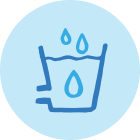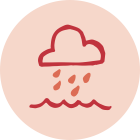
What We Do
Human Rights & reedom
Human rights recognize the inherent value of each person, regardless of where we live, what we look like, what we think or what we believe. Human rights are about being treated fairly, treating others fairly and having the ability to make genuine choices. Live & Learn’s developmental approaches are based on human rights as the foundation of strong communities where everyone can make a contribution and feel included…. At Live & Learn we believe that upholding human rights is essential to achieve sustainable development. Human rights law is binding, and every single one of the 17 Sustainable Development Goals is grounded in the Universal Declaration of Human Rights, international human rights treaties and other instruments, including the Declaration on the Right to Development.
Specifically, Live & Learn works to strengthen the rights of children and women. In partnership with the European Union, Live & Learn developed a peace education resource “Be the Future!” that is now used in schools throughout the South Pacific. Peace is the freedom to pursue our dreams. It is our ability to express ourselves. It is the opportunity to relate to others with understanding, good will and cooperation. We all want peace, but often there are barriers to peace, such as violence, conflict, discrimination and environmental destruction.
Peace education is about children developing the knowledge, skills, attitudes and confidence to participate in three main peace building activities:
- encourage networks and partnerships between schools, children, youth, teachers, governments, chiefs, elders, parents, the media and non-governmental organizations (NGOs)
- promote the integration of the concepts of human rights, environmentalism, humanitarianism, culture, gender equality and peace in all projects and programs
- promote action-based, effective and creative learning models and teaching methodologies
Environmental Protection
Environmental education were the first type of activities we started with over 30 years ago. Live & Learn’s environmental protection activities deliver low cost, community-based actions that protect biodiversity and fragile environmental regions while also providing alternative or innovative livelihood opportunities. Our projects cover environmental governance, biodiversity protection and education, invasive species management, conservation, and eco-tourism training….There is growing recognition that nature serves as the foundation for development over the long term because natural systems support our food production, clean our water, regulate our climate, and safeguard the Earth’s biodiversity. The Sustainable Development Goals show that the interlinkages between poverty eradication, basic human rights and environmental preservation are undisputable.
In all our projects we use the following principles to minimize environmental risks and ensure sustainability:
- Build on local strengths, leadership and ownership, and support and strengthen existing systems and structures
- Promote an inclusive society through inclusive, equitable implementation
- Build up the relationship, accountability and engagement between governments and smallholder farmers
- Deliver visible results, in rural areas, in the short term
- Avoid over engineering, set realistic timeframes, ensure predictability
- Develop and promote programmatic approaches and ensure activity is fully embedded in national policies
- Promote mutual accountability, disciplined and responsible partners
- Promote coordination and harmonisation with other environmental programs
Water, Sanitation & Hygiene
Most people turn on a tap for running water, or use a toilet several times a day, without even thinking about it. Today so many people lack access to safe water, and many lack access to a toilet. More people have a mobile phone than a toilet. Live & Learn implements water, sanitation and hygiene activities that focus on sustainability, scale, gender equality and social inclusion.
We combine locally contextualised water and sanitation system designs with a rights-based approach so that marginalised communities and individuals are able to use their own skills and resources. Water, sanitation and hygiene is essential for eradicating extreme poverty. We implement projects that specifically improve access to safe sanitation, promote positive hygiene behaviour change, protect the local environment, and help people recover water and sanitation services quickly after disasters.
Live & Learn uses contextualised community-led total sanitation with sanitation marketing so that vulnerable households have access to durable and desirable sanitation goods and services. We also adopt human-centred, social marketing techniques to address the motivators for hygiene behaviour change and menstrual hygiene management. Government partnership is a foundation of our WASH approach, enabling programs to work at scale and build long-term sustainability. Programs start by aligning with national WASH policies, then building engagement with the right government agencies.
Climate Change
Climate change goals focus on the integration of climate change measures into national policies, the improvement of education, awareness-raising and institutional capacity on climate change mitigation, adaptation, impact reduction and early warnings. Climate Change is already affecting communities in small island states. Maldives is highly vulnerable to the risks posed by climate change because of its size, isolation and narrow economic base. Climate projections are bleak, indicating the food insecurity will increase. Adaptive capacity is hindered by poor access to information and to innovative and appropriate technologies.
To address this, we work to strengthen the resilience of Maldives in the face of potentially catastrophic climate change events. This is achieved through supporting the mainstreaming of climate change adaptation into development planning and budgeting at all levels of government.
Building resilience to the impact of climate change in water, sanitation, hygiene, food security, income generation and gender equity is at the core of our work.
Disaster Risk Reduction & Response
Live & Learn works in vulnerable regions threatened by natural disasters, in addition to the impacts of climate change. These vulnerabilities are compounded by economic and social factors such as population growth, poorly planned coastal development, unplanned urban growth and land use, environmental and ecosystem degradation, and unsustainable use of natural resources.
Disaster risk reduction cuts across different aspects and sectors of development. Building disaster resilience is critical to achieving the goal of eradicating extreme poverty. Natural hazards are a cause of global food insecurity and hunger. Large shocks and extensive risks destroy agricultural assets and infrastructure, causing serious damage to the livelihoods and food security.
Building community resilience through collaboration is priority for the Live & Learn network. We work with communities and government to assess vulnerability and risks, integrate risk reduction across government policies, plans and budgets, safeguard livelihoods, food resources and water, promote climate resilient crops and farming techniques, and mobilise communities for coastal protection and sustainable management of forests and marine environments. Empowering women in human response and management is prevalent throughout all our disaster risk reduction activities.
Gender & Women’s Empowerment
Empowering women to participate fully in all aspects of life is essential to build stronger economies, and improve the quality of life for families and communities. Live & Learn aims to promote equality between women and men in all aspects of economic, social and political life. We work towards the standard set in the Sustainable Development Goal 5 on gender equality – including the full and equal involvement of women in shaping the vision of development, setting development agendas, and determining needs and priorities….We work to establish strong and functional relationships with men and women in a community before introducing topics that could easily be perceived as attempts to influence culture and challenge men’s authority.
- Promoting women’s voice and agency
- Promoting women’s decision-making and leadership
- Exploring how gender-based violence in a community negatively impacts all other progress
- Promoting women’s economic empowerment
Ongoing Projects
Stories
Work with Us






